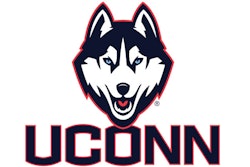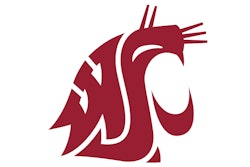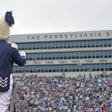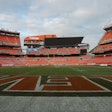Copyright 2017 Gannett Company, Inc.
All Rights Reserved
USA TODAY
The new NFL stadium in Las Vegas doesn't yet have a name and isn't expected to open until 2020. But when it does, at least one nickname certainly will apply: The House That Gambling Built.
The $1.9billion project never would have made it through the state legislature — or attracted the Oakland Raiders — without the support of the gambling industry, according to experts and the legislative record.
"The industry has been instrumental in the project," said Jeremy Aguero, an analyst who works for the Las Vegas Stadium Authority, the stadium's landlord.
After it opens, the Raiders also might not fulfill their potential there without even more of its support, possibly forcing the league to change its longtime anti-gambling policies purely out of business necessity, experts told USA TODAY Sports. The NHL is adding a team in Vegas this year and said it already has changed one key gambling-related policy to reflect its new "market reality."
A similar evolution by the NFL could be a game-changer in the larger push to expand legalized sports gambling — more so than simply being located in America's gambling mecca.
In November2012, NFL Commissioner Roger Goodell testified in a legal proceeding that gambling was No.1 on his list of threats to the integrity of pro football in the USA. In February, Goodell also said that having a casino own part of an NFL team "is not something consistent with our policies. Not likely a stadium either."
Yet in just a few years, the NFL will move into a new stadium that was promoted, enabled and governed by Nevada casino executives, paid for by gamblers and directly enriched by the betting industry.
Follow the money
First, the project was unanimously recommended to the legislature by an 11-member committee that included executives from six casino businesses that make money from legal sports gambling — Caesars Entertainment, Boyd Gaming, MGM Resorts International, Wynn Resorts, Las Vegas Sands Corp. and Station Casinos.
The committee was created by Nevada Gov. Brian Sandoval to identify and prioritize tourism improvement projects in Southern Nevada. In its recommendation, the committee noted the stadium would bring in more gambling, increasing gaming tax revenue by an estimated $4.3 million annually.
The stadium will be owned and overseen by the Las Vegas Stadium Authority, which is managed by a nine-member board that includes executives from Caesars and MGM. This group will be the NFL's landlord, an arrangement that appears out of step with what Goodell said in February about casino ownership of NFL stadiums.
Back then, casino boss Sheldon Adelson had just withdrawn his $650million stake in the project despite helping make it possible with Sandoval and the legislature. His potential investment raised questions about whether the NFL would have allowed him to own part of the Raiders or stadium in return.
He's no longer involved, but other casino officials will govern it on the Stadium Authority.
"The resort industry is involved in the Stadium Authority board, and, yes, we expect some will consider purchasing suites at the facility," Aguero told USA TODAY Sports.
NFL spokesman Brian McCarthy noted that the casino executives represent only two of nine board spots and that the Stadium Authority would not have rights to football-related assets or control of the stadium on a day-to-day basis. He said the NFL did not consider a Stadium Authority an "owner" in the context of its gambling policy.
"We would look very carefully at the rights associated with the lease," McCarthy told USA TODAY Sports. "So long as the essential controls and the economics are controlled by the team, we would not expect to view it as a problem with respect to our policies."
Board members also will not be paid and the Stadium Authority will not share in the stadium's operating revenue or profits, because that would jeopardize the non-taxable status of the stadium's bonds.
Support from gambling resort executives was necessary, because much of the money to help pay for the stadium — $750 million — is being funded by gamblers paying an increased room tax at their hotel/casinos. McCarthy noted the tax was "not on gambling revenues but on the hotel rooms."
The legislation that enabled the stadium — Senate Bill1 — still calls for much of that money to come from a defined "primary gaming corridor in the stadium district," around the Las Vegas Strip.
"The room tax is crucial; that's coming right out of their pockets," UNLV economics professor Stephen Miller said of the gambling industry.
And the money trail likely won't stop there.
To maximize revenue, the Raiders might need an even deeper relationship with the market's biggest industry — by selling stadium suites, advertising and sponsorships to resort/casinos, some of which is prohibited under the NFL's current gambling policy.
"While Las Vegas has made some strides towards economic diversification, gaming and tourism remains a dominant business," said David Schwartz, director of the Center for Gaming Research at the UNLV. "Prominent leaders like (casino boss) Steve Wynn have been vocal about how happy they are that the Raiders are coming to town, so I think that they will have plenty of buy-in. As the leading industry in the region, that support will be critical."
No sports books allowed
The Raiders looked to leave Oakland mostly because their 51-year-old stadium there didn't make them enough money from suites and other local revenue. They ranked near the bottom in total annual revenue with about $300 million despite playing in the Bay Area, one of the league's biggest media markets.
By contrast, Vegas will be one of the NFL's five smallest markets. Making money there will be more difficult without sales to the region's biggest businesses, such as MGM and Caesars.
For other businesses moving into Nevada, this wouldn't be an issue. But this is the NFL, which still has strict restrictions on how its teams and personnel do business with casinos. In 2015, the NFL effectively prohibited NFL players from participating in a fantasy football convention in Vegas because the event was going to take place in a convention facility owned by a casino. Its gambling policy prohibits players from participating in promotional activities or appearances at events held at casinos or gambling-related establishments.
In 2012, the NFL started allowing teams to accept limited advertising from casinos. No rule would prevent casinos from purchasing suites at the facility, McCarthy said. Yet the league still forbids advertising from casinos that have sports gambling, which would include all of the big casinos in Las Vegas and those with executives on the Stadium Authority board.
"The entity being advertised must not have a sports book and must not otherwise accept or promote gambling on actual sporting events," the NFL policy states. "In the case of entities with multiple locations, some of which include a sports book or otherwise accept or promote gambling on actual sporting events, the advertisements must clearly and prominently advertise the locations that do not have a sports book."
The policy stems from the league's opposition to traditional sports gambling, which is largely illegal outside of Nevada. For decades, the NFL has worried the expansion of such gambling would increase the possibility that its games would be corrupted by bettors offering bribes to fix scores.
'Logical evolution'
That policy still stands, even after the league recently approved the Raiders' relocation to Vegas by a 31-1 vote.
The vote had nothing to do with gambling or any change of position by the NFL about it. Instead, it happened because the Raiders had no better stadium option, and Nevada offered the best deal — a record $750million in taxpayer money.
But moving there has a way of changing minds. Just ask the NHL, which will debut the expansion Golden Knights next season as the first major pro sports team to play in Las Vegas — in an arena co-owned by MGM. The NHL recently had a similar policy restricting advertising from casinos that have sports betting.
Not anymore.
"The ability to enter deals directly with casinos with sports books is new," NHL deputy commissioner Bill Daly said. He said the NHL changed the rule to "reflect the Las Vegas franchise's market reality (and was) seen as a logical evolution to our current policies, which themselves have been evolving relatively rapidly."
The NHL doesn't allow the ads to promote sports gambling and is still against the expansion of legalized betting on NHL games.
Yet now that NHL teams are allowed to be direct business partners with such casinos, it's easier for that position to change, too. Sara Slane of the American Gaming Association predicts the federal ban on sports betting in more states could fall within three to five years. For that to happen, though, it probably will take the NFL and other leagues changing their minds about it, perhaps because of the closer relationships they're building with the gambling industry in Nevada.
"The law (which banned sports gambling in more states) was written for the leagues, so when Congress re-evaluates this issue, they're going to take the NFL's position on this very seriously," said Slane, senior vice president of public affairs for the AGA.
The Raiders didn't return a message seeking comment, nor did casino boss Wynn. MGM Resorts International President Bill Hornbuckle, who serves on the board of the Stadium Authority, also didn't return a message seeking comment.
In March, Goodell said the league "did not change any of our gambling policies in the context of the Raiders relocation. It wasn't necessary, and the Raiders didn't ask us to do that. We don't see changing our current policies."
It might not be necessary now, because the Raiders don't move in until 2019 or 2020. After that, a certain business principle might apply.
"If you're going into business, you don't want to handicap yourself by saying you can't serve some percentage of the market because you're prohibiting yourself from doing so," UNLV's Miller said. "That doesn't make a lot of sense."
Read More of Today's AB Headlines
Subscribe to Our Daily E-Newsletter
Terms and Conditions Privacy Policy



































